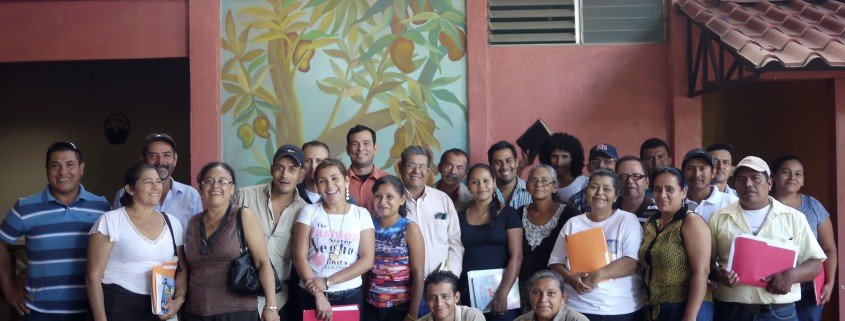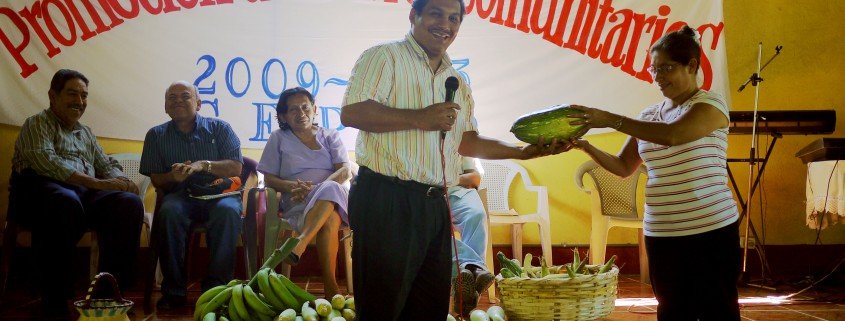Strategic Planning Workshop Transforms Dreams Into Skills
/in LEADERSHIP DEVELOPMENT/by Audrey WhiteUnity. Strength. Forward Movement. Love as a family. Love for God. Deep thankfulness. Hope for the future.
These are a few of the things CEPAD community leaders said they felt after a two-day workshop where they learned how to solidify their visions for their cooperatives and associations and spring forward into success.
Inocente Ramos Hernandez, the president of the community association for seven communities in the Matagalpa region, expressed his sincere thanks to the U.S. donors and friends who made the workshop possible with their donations to a special campaign in September. “Thank you so much for this gesture, we are so energized after these two days,” he said.
“It was an excellent opportunity to develop a plan we can implement,” Inocente said. “Our association focuses on training our associates in farming techniques and commercializing our products, and now we understand all the elements that will go into making that happen.”
With guidance from CEPAD staff, participants outlined goals, set mission statements and developed action plans that will allow their six community organizations to bring better financial opportunities to all 43 communities where CEPAD worked from 2009-2014. Read more
Communities Celebrate Five Fruitful Years
/in LEADERSHIP DEVELOPMENT/by Audrey WhiteAt a celebration in San Francisco Libre, community leaders gave a gift of squash, corn, plantains and limes to CEPAD staff. It was a beautiful gesture from families who are facing a difficult crop year because of record drought. And the gift held even more meaning because they learned from CEPAD how to grow a diversity of produce that didn’t exist in their communities before 2009.
“CEPAD has taught us to fish for five years, and today they are entrusting us with the fishing rod,” said Jose Reyes, a community leader from San Benito Uno.
He and others said they are ready and excited to take what they learned from CEPAD and continue to strengthen their crops, families, and businesses. In their testimonies, community members shared the ways CEPAD had changed their lives. After five years, farmers were producing a greater diversity of foods and higher quality products. Danilo Espinoza, who worked with the youth leadership and family development program, said CEPAD gave him a new lease on life after an illness badly damaged his eyesight.

With New Skills, El Ingenio Leaders Move Forward
/in IMPACT STORIES, LEADERSHIP DEVELOPMENT/by Audrey WhitePolvazal, and all the new communities in the Jinotepe region, have the potential to achieve a lot with CEPAD, said Cesar Chavez, a community leader from El Ingenio, one of the communities finishing its time five years with CEPAD.
“If they are serious, responsible and grateful they will see amazing results like we did,” Cesar said. After five years with CEPAD, the community has learned new agricultural techniques, created new opportunities for youth and women and developed an organizational structure that will carry the community into the future, Cesar said.
The community development committee there has already made progress — they successfully petitioned the local government to improve the road that goes through the community to improve access to schools and jobs. The road has improved access to goods and means it will be easier to implement future infrastructure projects.
“We haven’t achieved everything we want, and we have learned a lot that will help us continue into the future,” he said. “The next project we want to work on is getting potable water, because the one well we have only serves a few houses.”
Cesar says his two-year-old daughter Ixa will have many more opportunities.
“The biggest feeling I have is thanks,” Cesar said. “CEPAD believed in us, and that’s been just the beginning of so many changes. Ixa will never know the kind of poverty I did.”
In Polvazal, Community Leaders Tackle Challenges
/in LEADERSHIP DEVELOPMENT/by Audrey WhitePolvazal’s 42 families see every day as a new chance. They work the land, travel to the river for water and make sure their children attend school. The next five years CEPAD will accompany this community to help them harness their full potential.
Sonia Maria Esteban Gonzalez, a 33-year-old community leader and mother of three teenagers, uses tires as pots for different vegetables — but they are mostly empty this year. She says the community’s biggest challenges are adjusting their agricultural practices to account for increasingly dry years and developing a community organizational structure that will allow them to pursue big goals, like getting a better well in the community. Despite Polvazal’s many challenges, Sonia and others are optimistic.
“I have seen what has happened in the communities nearby, they have learned so much and life has improved a lot,” Sonia said. “I know that we can see similar progress here because people are ready to work hard and take it seriously.”
For the last five-year cycle ending this year, Polvazal was a control community in the Jinotepe region. CEPAD visited with leaders there regularly but didn’t implement programs directly. This made it possible to see the changes in communities working with CEPAD compared to those that weren’t. After the experience, Sonia and other community leaders are ready to get started and plan to look to leaders in nearby communities for advice.
“We appreciate CEPAD isn’t here just to help one person or bring supplies, it’s about working for the whole community and region,” Sonia said. “The communities in this area are friends and help each other.”
The community had no May harvest this year because of drought, and many people had weak September harvests because of continued water shortage and lack of seeds. The community is also concerned about deforestation, which CEPAD will help address by providing seedlings and training. CEPAD couldn’t be coming at a better time, Sonia said.
At The Heart of Short Term Missions: Reflections From A CEPAD Volunteer
/in DELEGATIONS/by Audrey WhiteBy Olivia Holt, Summer 2014 CEPAD Volunteer Summer
Throughout college I questioned the value of short-term missions. I mostly wondered if the price involved was worth it. Short-term mission trips can be expensive, and they consume a lot of funds. Couldn’t the host ministry better use those funds to advance their work? That money could be feeding hungry tummies, training pastors, or employing locals to build homes for those without shelter. I also wondered how much of a burden it was for the host to take care of a group of foreigners for a week. How are a ministry’s daily activities affected when everything is put on hold because a mission team has arrived? By no means can I address this issue in full, but those questions were on my mind.
I also wondered about the results. I had no doubt that short-term trips were beneficial for the visitors; I myself am a product of short-term missions. I have been changed because of my experiences on mission trips, and my passions have been shaped by what God taught me in those weeks. But, were they really good for the hosts?
A trip to Bluefields, Nicaragua, during my junior year of college eventually won me over to the realization that a short-term trip can be beneficial for everyone involved and a worthwhile financial investment. While my team was in Bluefields, we asked the leader of the ministry, Adrian, about this topic. His simple response meant everything.
“You can send money in an envelope, and it can do lots of things,” he said. “But you can’t send a hug or a smile in an envelope.”



